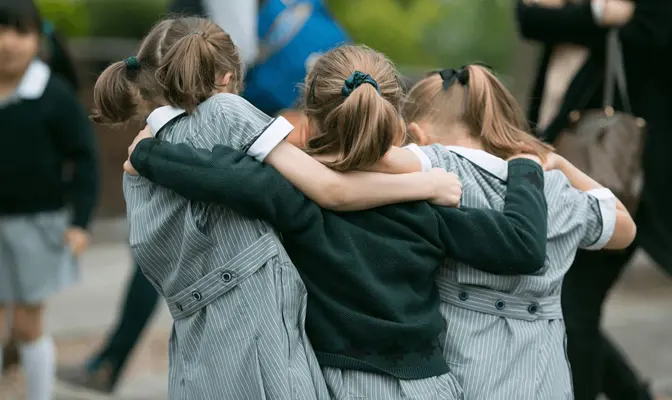
Year 9-10
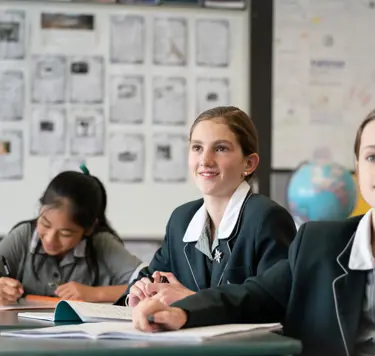
The Junior School approach to teaching and learning is underpinned by an integrated curriculum that stimulates creativity, curiosity and critical thinking whilst building a sound foundation in literacy, numeracy and cognitive skills.
We believe our approach to learning and wellbeing is the driver of our students' strong sense of belonging and achievement (as demonstrated by our exceptional NAPLAN results) and what sets us apart from other primary schools across Melbourne.
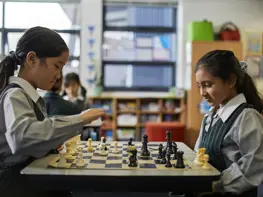
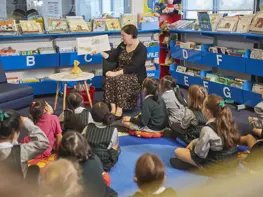
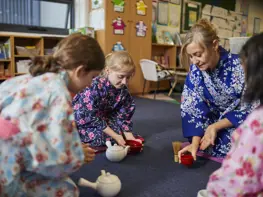
Junior School students participate in Visual Arts lessons every week. The Visual Arts curriculum seeks to develop students’ intellectual, imaginative and expressive potential in a wide range of two and three-dimensional art media. Students sequentially develop their skills and techniques whilst establishing knowledge of processes which in turn forms a basis for personal expression. The students develop an understanding of aesthetics and how Visual Arts relate to particular social, cultural and historical contexts.
With today's students being born into a world of technology, learning in Junior School encompasses the safe use of devices. Each Prep - Year 2 student is provided with her own iPad, and students in Years 3 and above have their own laptop computers.
Digital Technology lessons are part of the curriculum, including cybersafety, digital citizenship, coding, programming, animation, robotics along with integration with Science.
Education Outdoors is an important part of the Junior School experience and enhances problem solving skills, communication and resilience. Outdoor learning provides endless opportunities for exploration, experimentation and contextual learning. The Education Outdoor program in Junior School has been designed to offer students progressive and curriculum-based challenges.
Year 3 students attend an overnight camp at The Briars, Mount Martha. In Year 4, students attend Camp Waratah at Waratah Bay. In Years 5 and 6, Education Outdoors occurs at our MLC Banksia site. Each MLC Banksia experience is strategically planned to enable personal skill development, confidence building, teamwork and the opportunity to learn in a unique environment. Learning experiences are theme-based and have strong links to the Kew curriculum.
We are committed to providing evidence-based teaching, learning and assessment practices in all areas of literacy, aligned with current research. The research shows students require strong foundations in the early years for success in literacy in later schooling. Explicit and consistent instruction in the 5 key areas: phonemic awareness, phonics, fluency, vocabulary and comprehension, underpinned by oral language, provides all our students with the core skills they require to become successful readers and writers.
Effective literacy programs enable students to move between reading and writing. The teaching of writing incorporates metacognitive thinking, explicit teaching about audience, purpose and the structural and grammatical features of whole texts, paragraphs and sentences. It also involves the gradual release of responsibility from teacher to student through a sequence of stages and scaffolded lessons. Writers learn from other writers and the use of rich, mentor texts provide exemplars to students. Students also develop or build content knowledge and a strong vocabulary from these texts.
Spelling is explicitly taught. In the early years, the students must learn to hear the sounds in words and map them to letters developing phonological and orthographical knowledge. As students move through the middle and upper levels of primary school, the focus changes to the teaching and learning of morphemic and etymological knowledge.
Students’ progress in all areas of literacy is monitored and data is used to make decisions about their instructional needs within a multi-tiered system of support (MTSS).
The languages other than English taught in Junior School are Japanese and French: Japanese for students in Prep to Year 4 and French for Years 5 and 6 students. The language program in Junior School is designed to promote and establish awareness of language and the development of language skills and to develop an understanding of Japanese and French cultures.
Languages are taught using the communicative method; listening and speaking are of primary importance, with reading and writing being introduced progressively. The Language Assistant program provides opportunities for authentic communication with native speakers, special events, and excursions.
The Junior School Libraries are spaces in which we nurture a love of reading and provide access to a comprehensive collection of print and digital books. Library lessons promote literature, information and research skills whilst also enabling an awareness of the latest developments in information resources, technologies and services.
We have a rich and diverse program that includes lunchtime activities, visits by well-known Australian and International authors and illustrators, exciting Book Week events, a Book Fair and many opportunities for students to meet and have books signed by their favourite authors throughout the year.
The libraries contain a wide-ranging print collection of age-appropriate non-fiction, fiction, picture books, graphic novels, folio fiction, audiobooks, eBooks and DVDs.
The MLC Libraries Junior School Digital Library website also contains age-appropriate online resources, databases, eBooks and year-level topic guides, which can be accessed from school or home through the MLC Intranet.
A parenting collection is also available for loan. The books and DVDs available (borrowed under your daughter’s name) support parents on topics such as resilience, friendships, happiness, self-esteem, practical parenting, fitting in, raising boys and girls, autism, health and many other topics by esteemed authors such as Steven Biddulph, Dr Lea Waters, Andrew Fuller, Michael Grose, and Dr Lyndel Kennedy to name a few.
Units are based around a big question, idea, problem or concept. Linked Learning includes learning from multiple disciplines: Science and Technology, Drama, Media and the Humanities – Geography, History, Economics and Business, Civics and Citizenship.
Through Linked Learning students learn to ask questions and investigate real-world issues, ideas and phenomena. Students are taught effective research skills and experience social interactions through their collaborative groups. Through this approach, students engage their natural curiosity and desire to make sense of the world.
Science education is facilitated through several modes. Scientific thinking and skill development is incorporated in many of the Linked Learning units. This way students make connections between ideas and concepts across different disciplines. However, if elements of the Science curriculum do not “fit” in a Linked Learning unit, the teaching of the concepts and skills happens through stand-alone lessons.
Students have the opportunity to apply the skills and knowledge they have gained through Linked Learning to competitions such as the Science Talent Search and the Tournament of Minds.
We use evidence-based research to ensure the Mathematics curriculum is at the highest of standards, tailored to suit the needs of our students. Our students develop strong foundational skills that set them up for a lifetime of learning using mathematics. By integrating current research to inform best practice, our lessons incorporate explicit teaching, problem solving and collaborative learning practices.
With regular formative assessment, we know our students’ individual learning needs, and use this data to plan programs which support every student. To further differentiate our lessons, we also have dedicated learning support and extension opportunities, ensuring every student has the opportunity to achieve their personal best.
Through participation in the Junior School Music program every student can experience the joy of playing music, regardless of prior experience. During class music lessons, students are involved in a wide range of music activities including singing, speech rhymes and poems, moving and dancing, playing melodic and non-melodic percussion instruments and listening to music. All students also participate in choir sessions and there is a great culture of singing within the Junior School. There is also an auditioned choir for Years 5 and 6 students – the Junior School Concert Choir, which performs regularly at events both within and outside of the College.
Year 2 students participate in a Strings Program learning violin, viola or cello. Students in Years 3 and 4 learn the recorder within the class music program. Year 5 students participate in the Band Program, incorporating Strings, Woodwind, Brass and Percussion instruments.
Students in Year 6 have an opportunity to perform a musical each year. Recent productions include Aladdin Jnr, Moana, and Chitty, Chitty Bang Bang.
All students participate in an extensive Physical Education Program based around encouraging students to do their best. We aim to create a fun environment, which will allow each student’s skill level to flourish, and her passion for activity to continue to grow. There will be many occasions through our program for students to explore new activities and refine known skills. Together with this, students can move outside their comfort zones and experience some challenging but rewarding situations.
Students all complete a semester of aquatics, which includes water familiarisation, stroke technique, water safety and diving. When the students are undertaking aquatics, this constitutes half of their Physical Education program.
MLC Active is a program designed by the MLC Physical Education staff to assist students in developing and understanding fitness, and it also plays a vital role in encouraging students to strive for their best and then work towards individual fitness goals.
All Prep to Year 6 students participate in the Junior School Sports Day, focusing on fun and participation. Students compete against other students of their year level in a variety of novelty and athletic events, gaining points for their allocated House. There is also an opportunity for students in all year levels to compete in House gymnastics. In addition, Years 4 to 6 students also compete in year-level Inter-Class and Inter-House athletics and swimming events during their Physical Education classes.
Prep to Year 6 students participate in weekly Religious Education classes. Content includes a focus on world religions, leadership and ethics, spirituality, RE and Art, identity, human rights and the rights of the child, and mental health, including mindfulness and meditation.
When a child has a positive sense of self, she is more likely to learn and be courageous in her endeavours. We think about wellbeing as a combination of feeling good, functioning well, and doing good for others.
This is why our Junior School focuses on personal and interpersonal skills, working collaboratively with others, communicating effectively, and decision making. There is also a strong focus on social justice and thinking beyond oneself.
Students’ social and emotional learning is promoted through developmentally appropriate curriculum, programs and activities which aim to build a positive sense of identity, a range of supportive relationships with others and a sense of belonging within the MLC community. These programs are designed under the whole College wellbeing framework of PROSPER.
Some of our Wellbeing initiatives include:
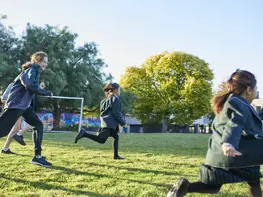
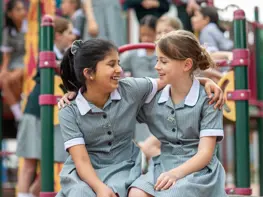
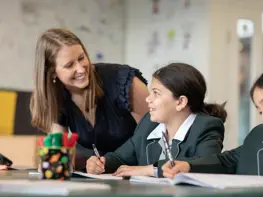
The Dramatic Arts Department offers an exciting after school drama program for students in Years 5 and 6 who are interested in drama and performance. It is open to all students regardless of experience and offers them a range of drama experiences that extend and build upon their skills. The course focuses on building confidence and the development of creative expression in the individual.
Contemporary research into the effects of Music Performance on the development of young people supports the claim of music educators, musicians, and informed parents of the benefits of involvement in music as part of the curriculum or a leisure time activity. At MLC we provide students with the opportunity to learn a wide variety of instruments to support their development and enrich their MLC experience.
The MLC Dance Program caters for students from Prep (except Ballet, which is from 4 years old). The Dance Program caters for MLC and non-MLC students and is devised and taught by dance professionals and consists of three levels (Junior, Intermediate and Advanced).
The MLC Cheerleading program caters for students from Year 1 upwards. All cheerleading students develop strength and flexibility as well as sport-specific skills in dance, gymnastics, stunting and teamwork. The program consists of two classes and four or more competitive teams
Students can make friends outside their classroom in a range of clubs that run every day, including Art Club, Chess Club, Languages & Culture Club, Photography, Signing Club, Science Club and Writer's Workshop.
Over 14 sports on offer across the Junior School including: